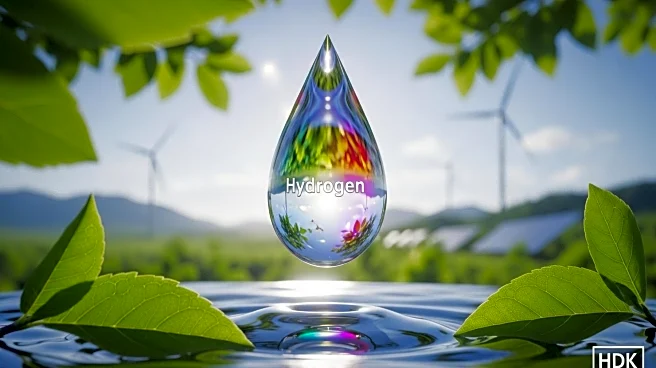What's Happening?
Researchers have identified extensive reserves of natural hydrogen beneath the Earth's crust, which could power the planet for up to 170,000 years. This discovery, detailed in a study published in Nature Reviews, suggests a promising alternative to current hydrogen production methods that rely heavily on fossil fuels. The study highlights two primary mechanisms for natural hydrogen generation: water-rock reactions and radiolysis. These processes occur over long geological timescales and present an opportunity for cleaner energy production. Geological settings conducive to hydrogen accumulation are globally distributed, indicating universal accessibility. However, extracting natural hydrogen poses challenges due to its rarity and the complexity of geological factors required for accumulation.
Why It's Important?
The discovery of natural hydrogen reserves offers significant environmental and economic benefits as a clean energy source. Hydrogen is crucial in the transition to clean energy due to its ability to burn without emitting greenhouse gases. The study proposes tapping into naturally occurring hydrogen, which could reduce carbon emissions and contribute to global climate change efforts. Natural hydrogen has a low carbon footprint, comparable to 'green' hydrogen derived from renewable electricity, making it a competitive alternative to fossil fuel-derived hydrogen. If exploration and extraction technologies advance, natural hydrogen could become a cornerstone of a future clean energy system, impacting industries and transport sectors that are difficult to decarbonize with electricity alone.
What's Next?
Despite its potential, extracting natural hydrogen poses significant challenges. Much of the generated hydrogen has likely escaped into the atmosphere or been consumed by subsurface microbes. High-purity hydrogen accumulations are rare and often mixed with other gases, complicating the extraction process. Exploration and extraction technologies need refinement to overcome these hurdles and unlock the full potential of Earth's hydrogen reserves. Researchers continue to explore this promising resource, aiming to develop the technology and infrastructure needed to harness Earth's hidden hydrogen reserves effectively.
Beyond the Headlines
Natural hydrogen production is not renewable on human timescales, as these vast reserves result from millions of years of slow geological processes. Once extracted, they will not replenish. The economic and environmental benefits of natural hydrogen are compelling, with cost estimates suggesting production could be as low as $0.5 to $1.0 per kilogram. This affordability could significantly impact industries and transport sectors, contributing to the global energy transition.








